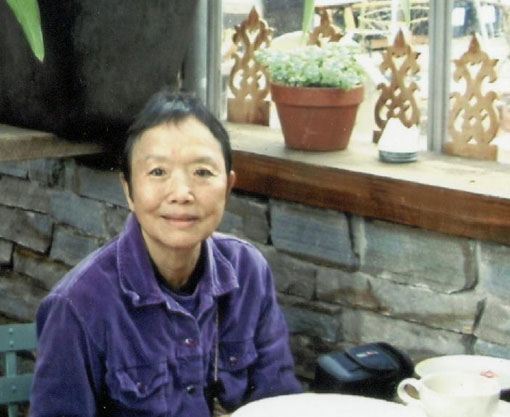Li-ching Chang (Zhāng Lìqīng / 張立青 / 张立青 / Zhang Liqing) was born in Changyi (near Qingdao), Shandong Province, China, on October 5, 1936. When she was 5 years old, her family sought to escape the fighting (between the Communists and the Nationalists) in her native Shandong Province and fled inland to Sichuan, eventually settling in Chengdu. In 1947 Li-ching’s family followed Chiang Kai-shek’s armies and moved to Gangshan, southern Taiwan. Li-ching attended Tainan Normal School. The same school at the same location has since been expanded to become the National University of Tainan. Upon graduation from this teacher training high school, Li-ching taught in elementary schools for several years. During this period, she also joined an army drama troupe.
After an intensive period of preparation for the college entrance examinations, Li-ching was successful in entering the Chinese Department at National Taiwan University, from which she received her B.A. degree in 1964. She also went on to earn an M.A. (1966) at NTU, with a thesis focusing on the works of the early medieval poet, Tao Yuanming. Later, she enrolled in a graduate program of Chinese studies at the University of Washington in Seattle, and there she earned another M.A., writing a thesis on the modern Chinese playwright, Cao Yu.
Li-ching was a superb teacher of Mandarin and was employed by numerous outstanding institutions of higher education, including the University of Washington, the Oberlin program at Tunghai University (Taichung, Taiwan), Middlebury College, Harvard University, Bryn Mawr College (joint program with Haverford College), the University of Pennsylvania, and Swarthmore College. Li-ching was co-founder and co-editor of Xin Tang, a journal of romanized Chinese. She served on the editorial board of the ABC Chinese-English dictionaries at the University of Hawaii and made a virtuoso translation of Zhou Youguang’s The Historical Evolution of Chinese Languages and Scripts (published by The Ohio State University National East Asian Language Resource Center in 2003).
She generously provided several of her important works to this Web site, including:
- an original short story, Dàshuǐ Guòhòu (After the Flood)
- an original essay, “Jiǎntǐ” duì “Fántǐ” — “Yǔ” hé “Wén” Bù Yíyàng (“Simplified” versus “Complicated” — “Language” and “Script” Are Not the Same)
- her translation of Comparing Chinese Characters and a Chinese Spelling Script — an evening conversation on the reform of Chinese characters, by Lü Shuxiang
- her Hanyu Pinyin version of Y.R. Chao’s Mandarin translation of the Humpty Dumpty section of Through the Looking-Glass
Li-ching lived in Swarthmore, Pennsylvania, with her husband, the scholar Victor H. Mair.


I send my deepest condolences to the Mair family.
This is very sad news. I would like to offer my condolences to her family and wish them a lot of strength.
My condolences.
My condolences. Her translation of “The Historical Evolution of Chinese Languages and Scripts” by Zhou Youguang has been my main resource in my study of pinyin.
Sincere condolences to to her family and friends.
So sorry to hear this news, I remember her fondly as a wonderful teacher. My deepest sympathies to the family.
Zhang Laoshi was a wonderful inspiration to all of us Chinese language students at Swarthmore. And her care and dedication to teaching made a life long impact on us all. Thank you Zhang Laoshi for all you did. Without you I wouldn’t be where I am today. You are in my prayers.
-Brian Wong Swarthmore College ’96
Zhang Laoshi was beautiful, kind and a splendid teacher. God bless her!
Li-ching was an inspiration to people battling debilitating disease and those who love them. Her model of courage, creativity and zest for life shines brightly for us all. May her family and friends be comforted in their loss.
Pingback: Pinyin news » new book in Pinyin
Thank you, Teacher Chang.
David Bedell/Bai Dawei, Swarthmore ’85